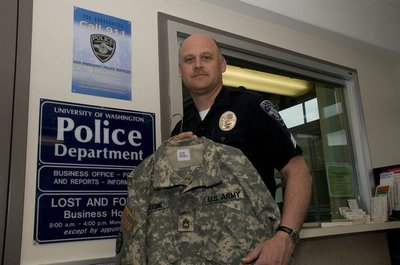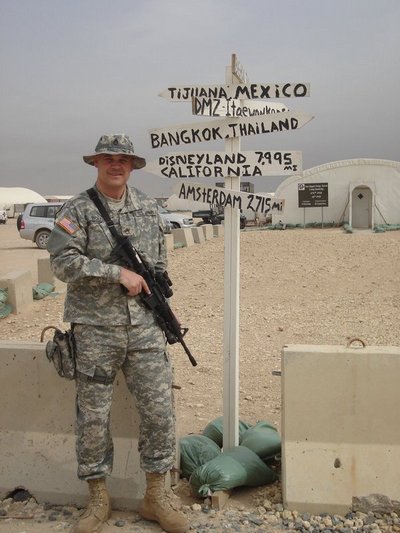May 15, 2008
From UW Police to Iraq — and back again
Sergeant John Bolding is back working with the UW Police after more than a year off campus serving with a somewhat larger force — the U.S. Army National Guard, stationed in Iraq.
From April 29, 2007, to March 23 of this year (soldiers tend to remember such dates with accuracy), Bolding served with the Army Reserve’s 104th Division at the Kirkush Military Training Base. There as a logistics adviser, he supplied and helped train members of the Iraqi police and army.
And while he’s glad to be back at the UW, Bolding said his experience “in country” was a positive one, and that he believes the Iraqis are making slow but steady progress toward managing the country on their own.
“They’re beyond the infancy stage, it’s more like their toddler stage, but they are making significant progress,” Bolding said, choosing his words carefully. He said, too, that the Iraqi forces he saw were “very receptive” to American help — “The majority of the people we worked with, they’re very anxious to get their country back up on its feet.”
Bolding is 45. He and his wife, Betsy, have a 15-year-old daughter who attends Kamiak High School and is, he said, an outstanding volleyball player. He kept in touch via long-distance phone and e-mail during his service abroad, and also followed her games online. There is much military service in his family: Bolding’s father served in the U.S. Army between the Korea and Vietnam conflicts and his brother, also in the Reserves, served in Iraq a few years back.
Though he wanted to be in law enforcement all along, Bolding said he began his working career in banking. After graduating from Washington State University with a degree in criminal justice, he took a stock room job at Washington Mutual Savings Bank and worked his way up for the next nine years. But it wasn’t really what he wanted to do, so he joined the Army Reserve in 1996 as a Supply Specialist working in logistic operations. The next year he landed a job with UW Police.
He got promoted to sergeant at the UW Police in July of 2006, just before being called up to active service. In 2002 he was reassigned to become an instructor in what’s called the Chemical Corps, where he trained U.S. soldiers in the Chemical “MOS,” or military occupation specialties. This included such things as detecting and removing contaminants and laying down “smoke screens” for military actions. During his deployment he returned to his supply training. “I was helping to train the Iraqi army in logistics operations,” he explained.
Though there are few truly safe places in Iraq these days and U.S. Army personnel are heavily armed wherever they go, Bolding said his life was never directly in danger, nor was he involved in combat. “I was fortunate to be in a pretty quiet area,” he said, “so I feel very fortunate that way.”
Still, there were challenges. “In dealing with the lack of fundamentals they have over there, you definitely come back with an appreciation of what you have here,” he said. Power, provided only by generators, was often short. And then there was the constant heat. “A.C. was pretty much nonexistent,” Bolding said.
So when he got back, some aspects of normal life here seemed special. “The fact of being able to listen to a radio station or to go take a walk without having to worry about, ‘OK, where is the nearest bomb shelter?'”
Bolding said it might take years for Iraq to settle down and begin to heal. “From what I have seen and from dealing with the Iraqis and the people I’ve been training, they’re very appreciative. Is it going to make a difference in the next five or 10 years? Probably not. I think what we’re doing will more impact the next generation. They’ll see the biggest changes.”
Will he have to return? As a member of the Reserves, the answer is always a possible “yes.” “As long as you’re associated with the military there’s always the chance,” he said. “And if I’m called to go, I go.”
And when this latest unpleasantness blows over, Bolding said, he’d even like to return for more peaceful reasons. “When that area settles down and everything is back to normal, I wouldn’t mind going back as a civilian and touring. There were some beautiful areas I never really got a chance to see.”
Here at the UW, Bolding will be in charge of crime prevention for the UW Police. This will include participating in public presentations and welcomes for new students, and running some of the violence prevention workshops the UWPD frequently offers. He also supervises the process of reporting UW crime statistics to national authorities to satisfy the requirements of the Clery Act.
And while recent American history tells of returning war veterans being treated disrespectfully because of inflamed political opinions, Bolding said his reception has been great. When coming home from a mid-tour leave, he said he stopped in the Dallas-Fort Worth airport “and they had an awesome reception. People were lined up everywhere from where you got off the plane all the way down past baggage claim and out the door!”
His colleagues at UWPD were glad to see him back in action on campus. “We all really missed John during his deployment. He’s a great sergeant, with excellent common sense, knowledgeable, and a pleasure to work with,” said Ray Wittmier, interim chief. “However, the most important thing is that he was able to return safely.”
So if you see Sergeant Bolding you might welcome him back to campus. And you might also find yourself saying, “Thanks.”





